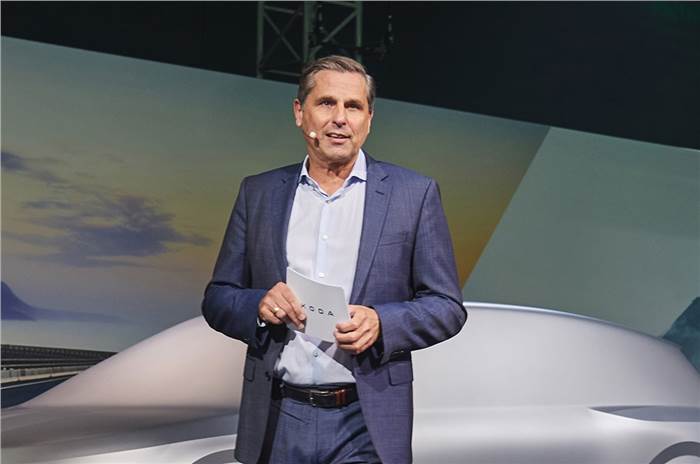Skoda Auto CEO Klaus Zellmer says mild-hybrids are advisable for a cost-sensitive market like India; strong and plug-in hybrids only in higher segments.
Skoda Auto CEO Klaus Zellmer has confirmed that along with the brand’s plan to launch its EV in India by 2027-28, the Czech company is looking at the viability of introducing hybrid models, specifically mild-hybrid ones.
“We’ve begun to see in Europe and China that having something in between a BEV and ICE is something consumers actually prefer at this point of time. In our [international] lineup, the Kodiaq and the Superb come in with a plug-in hybrid and an e-range that’s higher than 100 kilometres,” he said. However, Zellmer added that the challenge with plug-in hybrids is the cost factor. “In a cost-sensitive country it’s more advisable to look at mild hybrids, and strong and plug-in hybrids can maybe come in the upper segment,” he explained.
- Skoda Octavia gets 48V mild-hybrid powertrain options abroad
- VW Group in discussion with ‘a lot of partners’
- If no partner is found, VW Group still willing to invest in India
While Skoda hasn’t had a hybrid car on sale in India since its entry into the market over two decades ago, the Czech brand does have mild-hybrid (e TSI in VW speak) and plug-in hybrid (iV) cars and SUVs available in international markets. The recently revealed Octavia facelift has a 48V mild-hybrid system with the 1.5-litre turbo-petrol engine and 7-speed dual-clutch auto combination. In addition, pricier models like the Superb and the Kodiaq get a plug-in hybrid system, which combines the 1.5 TSI engine with a 25.7kWh (gross) battery. The combined output is 204hp.
Another point to note is that the new MQB A0 37 platform, which Skoda is currently evaluating for India, is capable of accommodating a battery pack for a petrol-hybrid powertrain. Models based on this platform will be larger than the India 2.0 cars (namely the Kushaq and Slavia), and be able to support advanced electrical and electronics architecture. This would mean they would be more feature-rich than the upcoming Skoda compact SUV as well, which is expected to get features like a 360-degree camera and an ADAS suite.
Volkswagen Group’s India partner search
As we had reported earlier, the Volkswagen Group is in the process of finding a local partner to leverage its market proximity and expertise in procurement and sourcing. Zellmer said that at this point, both standalone operations and a local partnership are open options.
“One option is the standalone option. I also believe in a scenario where we find a partner in India to be more in tune with society and customers. We’re currently discussing with a lot of partners and have to very carefully choose the right one,” he said.
He believes that a ‘true partnership’ combined with Skoda’s engineering can be a winning combination in the Indian market. “We believe in skin in the game in terms of engineering competence, sales competence and procurement competence. It has to be on an eye level for both partners,” he adds.
Finding the right partner could help Skoda Auto launch quality products at the right price, a feat that the company has struggled to achieve in the last 20 years. The company, which currently retails the Kushaq and Kodiaq SUVs along with the Slavia and Superb sedans, accounted for 1.19 percent of India’s over 4-million-units passenger vehicle market in 2023, according to auto intelligence firm JATO Dynamics. The company is targeting a 5 percent market share by 2030 and Zellmer believes that its upcoming line-up of electric vehicles (EVs) and SUVs could help it grow in the market.
The Volkswagen Group already has a relationship with Mahindra to supply EV components for the Indian carmaker’s upcoming INGLO-based EVs and it would make business sense to deepen this relationship further to share costs and technology in developing a low-cost EV. The VW Group is building three giga factories in Germany, China, and Spain. The company’s potential partner in India could gain from the Volkswagen Group’s expertise in battery cell manufacturing.
The company’s future investment in the Indian market will depend on what route it will take in terms of a future partnership. Sources close to the company said that in the off-chance that they don’t find a partner in India, the Group is still willing to invest in the market.
For now, Zellmer is on an ambitious path of launching a battery electric vehicle (BEV) by 2027-28. “We’ll have to look at BEV at some point of time now that subsidy programs are also available. That’s a new growth potential. We’re there for consumers to make their decision based on our best offer,” he said.
Zellmer also added that apart from the upcoming sub-four-metre compact SUV, the company will continue to consider other models for Indian consumers, including intensively testing the popular all-electric Enyaq in the country. “EV penetration in India is expected to grow to between 15-30 percent, and our global strategy is to offer customers the ‘best of both worlds’ with their choice of electric-or highly efficient combustion powertrains,” he concluded.
Also see:
Skoda Slavia DSG long term review, 5,700km report

























